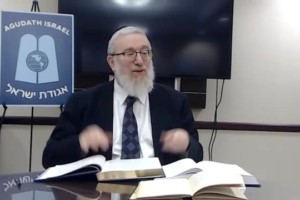NY Senate Passes Education Tax Credit Bill; Focus Now Shifts to Governor’s Budget
The New York State 2016 legislative session has barely begun, yet the Senate has already passed a bill of major importance for the nonpublic school community: the Education Investment Incentives Act. This bill, sponsored by Senator Marty Golden, co-sponsored by Senator Simcha Felder, and long championed by Agudath Israel of America, would provide significant tax credits for scholarship funds for needy yeshiva students.
More specifically, the bill would provide tax credits to individuals, corporations, and partnerships that donate money to public schools, charter schools and, through “educational scholarships,” to students who attend schools that provide religious education.
The Education Investment Incentives Act would encourage the private sector to give such donations to yeshivos and yeshiva students by providing a tax credit of 90% for eligible donations. Thus, for example, a $1,000 contribution would yield a $900 reduction in taxes. Currently, a $1,000 donation results in a tax deduction, which has a significantly less substantive reduction in tax burden, dependent on one’s tax bracket.
While it remains to be seen if this bill will pass the subsequent hurdles to passage, including an upcoming battle with the State Assembly, this is an excellent step in a headline issue that has long been championed by Agudath Israel. Indeed, education tax credits were identified as the organization’s top legislative priority in a recent letter from Agudath Israel’s executive vice president, Rabbi Chaim Dovid Zwiebel to New York Governor Andrew Cuomo.
Another issue that Agudath Israel advocated for in its annual letter to the governor included a request to close the CAP shortfall. While Agudath Israel, together with other advocacy groups, has successfully secured $250 million to nonpublic schools over the next two years, by Agudah Israel calculations, the state still owes at least $50 million to nonpublic schools. The shortfall was caused by a flawed formula employed by the state to fulfill its legal mandate to reimburse nonpublic schools for certain required services. Agudath Israel asked the governor to verify the shortfall and remedy it.
Rabbi Zwiebel also noted that while nonpublic schools in New York City, Buffalo and Rochester face rising costs in maintaining immunization records due to changing vaccination requirements and Department of Health regulations, the rate of reimbursement has not changed in over 30 years. Rabbi Zwiebel proposed that the Governor increase the budget for Mandated Services reimbursement by $5 million, to help schools cover these costs.
In the past three legislative sessions, nonpublic schools received $4.5 million in funding for security equipment. With the recent escalation of terrorism in the Middle East, Europe, and the US, the need to make our schools more secure is that much more pressing. Rabbi Zwiebel urged the governor to propose a $10 million appropriation in security funding for nonpublic schools, and to expand the menu of equipment that schools can purchase with this funding.
Finally, Rabbi Zwiebel requested that the governor include $1 million in his budget proposal to reinstate an Office of Nonpublic Schools within the State Education Department (SED), headed by a high-level Department official to serve as a key liaison between SED and the nonpublic school community. Though the SED created the office of Assistant Commissioner for Nonpublic Schools in 1979, the position no longer exists and there is no nonpublic school office currently representing the interests of the nonpublic school community. The reinstatement of such an office will help ensure that the nonpublic school community has a voice in the halls of the State Education Department regarding issues and policies that affect them.
“The over 400,000 children who attend nonpublic schools in New York State represent approximately 13% of all schoolchildren statewide,” Rabbi Zwiebel said. “As you work on developing your executive budget for the 2016-17 fiscal year, we respectfully appeal to you once again to bear in mind the needs of these children…”
The Governor is expected to release his proposed budget on January 13, 2016.



